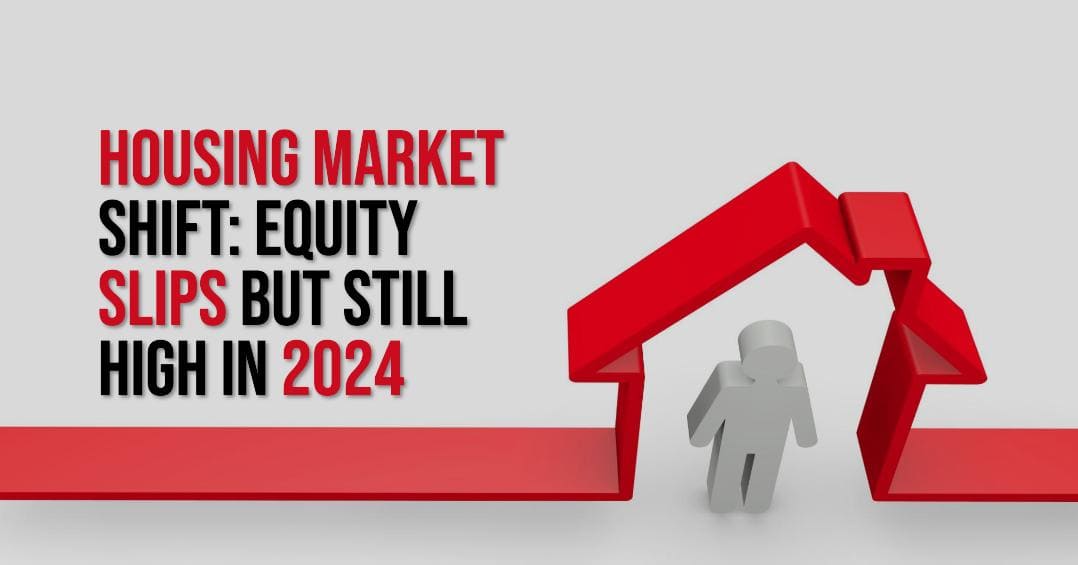There's good news and not-so-bad news for American homeowners. Let's unpack the latest data from ATTOM, a leading real estate data provider, with a specific focus on state, county, and metro area variations.
Housing Market Shift: Equity Slips But Still High in 2024
The good news: Homeownership equity remains high.
In the first quarter of 2024, nearly half (45.8%) of mortgaged homes in the United States were considered equity-rich. This means that the homeowner owes less than half the estimated market value of their home.
This is a solid financial position to be in, providing homeowners with a valuable buffer and the ability to access the cash stored in their home for things like renovations, repairs, or even starting a business. Imagine the peace of mind that comes with knowing your home is an asset that can be tapped into when needed.
A Cause for Caution, But Not Panic:
This equity level is down slightly from the previous quarter and the same period last year. It's the third straight quarterly decline, reaching a two-year low. There's also a small uptick in the number of homes considered seriously underwater, meaning the homeowner owes significantly more than their home's worth. While this number is still relatively low, it's a sign worth monitoring.
Understanding the Shift by Region:
The decline in equity-rich homes was concentrated in the South, with states like Kentucky (down to 28.7% equity-rich) and South Carolina (down to 40% equity-rich) leading the decrease. These states may be facing economic challenges or a slower housing market recovery compared to other parts of the country.
In contrast, some Midwestern and Western states saw an increase in equity-rich homes. South Dakota (up to 51.5% equity-rich) and Montana (up to 58.7% equity-rich) were among the top improvers. This could be due to a combination of factors, such as a more stable job market, a healthy influx of new residents, or a slower pace of home price appreciation compared to the coasts.
This suggests that potential buyers looking for a starter home with good equity potential might be better served looking in areas like the Midwest where affordability is more attainable.
At the other end of the spectrum, expensive coastal markets like those in California and Florida, which have consistently held high equity levels (Vermont: 82% equity-rich, California: 58.6% equity-rich), may be a better fit for buyers with a larger budget or those looking for a second home investment property.
Equity Leaders and Laggards by State and Metro:
Upscale markets with high median home values still boast the highest equity levels. States like Vermont (82% equity-rich) and California (58.6% equity-rich) continue to lead the pack. This isn't surprising, as these areas often experience strong and steady home value growth, fueled by factors like a booming tech industry or a limited supply of available land.
Conversely, the Midwest and South have the most homes underwater. Louisiana tops the list, with over 11% of mortgaged properties underwater. Counties like Campbell County, Wyoming (a mere 3.9% equity-rich) also face similar challenges, often due to a combination of a less diversified economy and a decline in natural resource extraction industries.
Taking a closer look at metro areas, San Jose, California reigns supreme with a whopping 69.3% equity-rich homes, likely due to its status as a major tech hub and a median home price of $1.4 million. Baton Rouge, Louisiana, on the other hand, sits on the opposite end of the spectrum with only 12.7% equity-rich properties and a median home price of $212,533.
This data paints a clear picture of the vast differences in housing market performance across the country, with some areas continuing to see strong growth fueled by robust local economies, while others grapple with stagnant wages and a surplus of available housing units.
What This Means for Homeowners:
Homeowners should be aware of the trends in their specific area, including state, county, and metro data. This information can be critical when making decisions about buying, selling, or refinancing a home.
For example, a homeowner in a state like Vermont with a high percentage of equity-rich homes might feel more comfortable taking on a home equity loan to finance a renovation project, knowing their home value is likely to continue to rise.
Conversely, a homeowner in a state like Louisiana with a higher number of underwater mortgages may want to be more cautious with debt and focus on building equity in their home.
Navigating the Market:
Consulting a local realtor can be a valuable resource for homeowners looking to understand the specific dynamics of their market and make informed decisions. A realtor can provide insights into recent sales data, comparable properties, and overall market trends. This information can be crucial for homeowners looking to get the most out of their investment, whether they are buying, selling, or staying put.
The coming months will be interesting for the housing market, with a mix of forces potentially pushing prices up or holding them steady. Homeowners looking to sell may want to act soon if they're in an area where equity levels are dropping.
On the other hand, those looking to buy may find some opportunities as affordability concerns become a bigger factor for some sellers. By staying informed about market trends and consulting with a local realtor, homeowners can make sound decisions about their real estate investments.
ALSO READ:
Nearly 100,000 U.S. Properties Faced Foreclosure Filings in Q1 2024
Foreclosure Rates on the Rise Again: 3% Increase in Q1 2024
Housing Market Predictions for Next 5 Years (2024-2028)
Mortgage Rate Predictions for Next 5 Years
Mortgage Rate Predictions for Next 3 Years: Double Digit Rise




